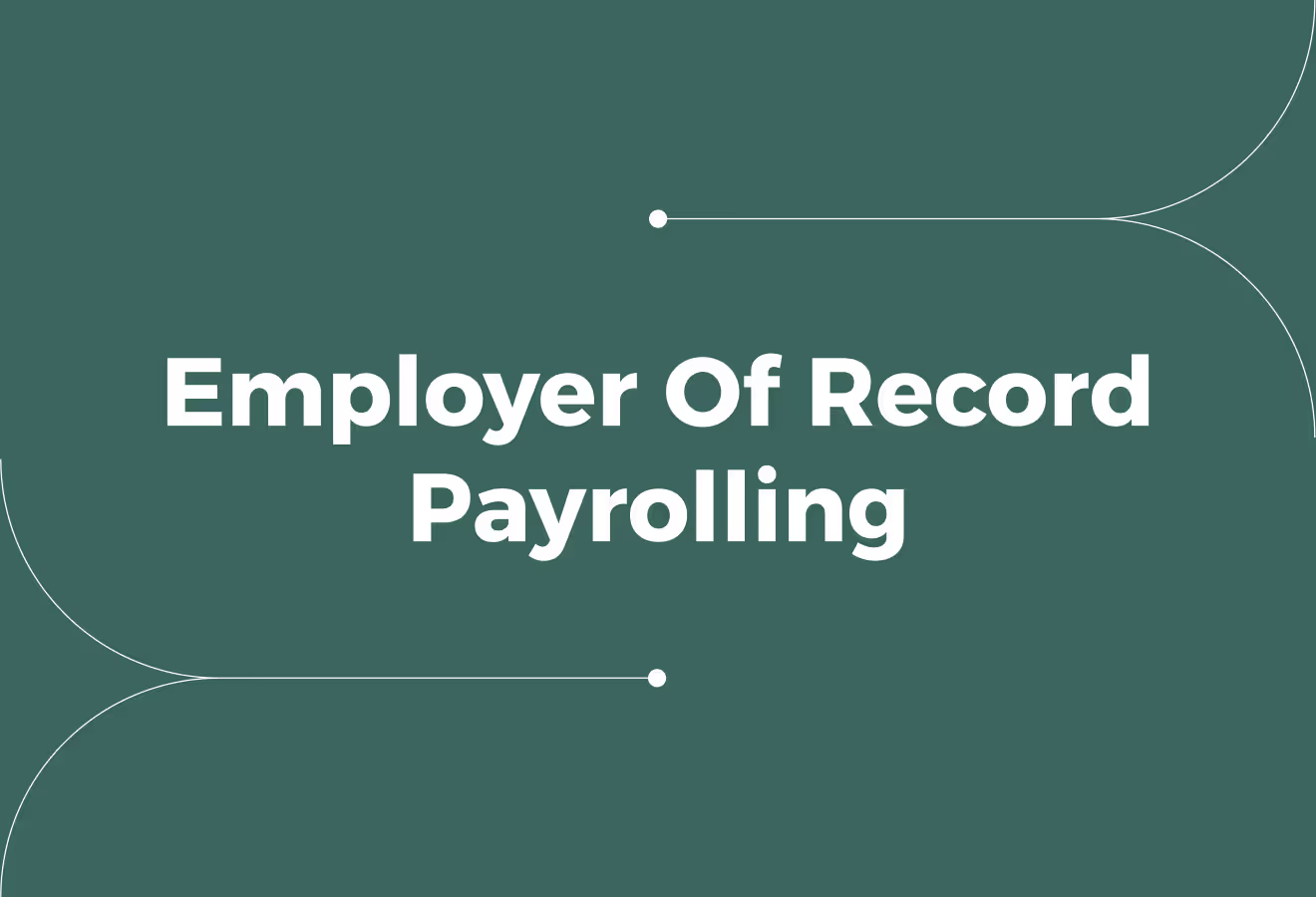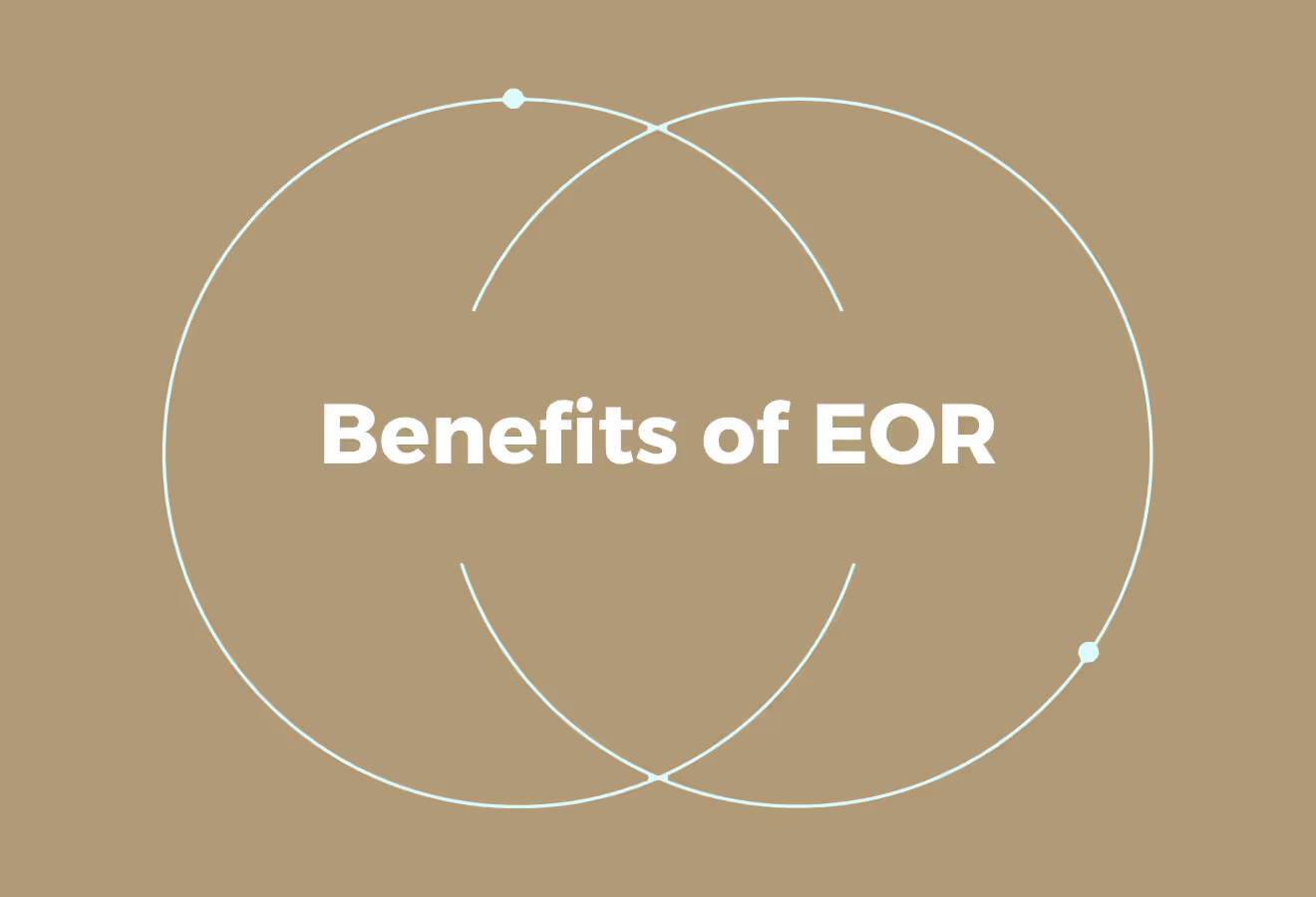What Is Employer Of Record Payrolling? A Guide For Global Employers

What Is Employer Of Record Payrolling? A Guide For Global Employers
Expanding into a new country can open the door to a broader talent pool, but it also introduces complex legal and administrative hurdles. One common challenge is the requirement to establish a legal entity before hiring local employees, an often time-consuming and resource-intensive process.
To simplify global workforce management, our global HR system helps companies onboard international employees, maintain compliance with local labor laws, and integrate new hires into their company culture, streamlining the process from day one.
What Is ‘Employer of Record Payrolling’?

Employer of Record Payrolling allows businesses to legally employ workers in countries where they do not have a registered entity. Instead of opening a local office or handling complex foreign labour laws, companies can partner with an EOR provider who acts as the legal employer on their behalf.
Unlike traditional payroll outsourcing, which focuses solely on salary payments while leaving legal responsibility with the employer, an EOR assumes full legal responsibility for the employee. This includes managing employment contracts, onboarding, local tax registration, payroll compliance, and statutory benefits.
In practice, this means the EOR processes salary payments, withholds and remits taxes, files documentation with local authorities, and ensures benefits are provided according to national regulations. The client company maintains day-to-day control of the employee's role and responsibilities, while the EOR ensures legal and payroll compliance.
This setup is especially useful for companies hiring internationally without the time or resources to open legal entities in every location. It enables faster onboarding, reduces risk, and ensures compliance with local employment laws.
Related Reading
- Consequences of Payroll Errors
- Employer of Record vs Staffing Agency
- Challenges of Managing a Global Workforce
How EOR Payrolling Works Step by Step

Step 1: You Select the Candidate, and the EOR Becomes the Legal Employer
You find a promising candidate in another country, but your company doesn’t have a legal presence there. Instead of opening a local entity, which can take months and cost thousands, you partner with an EOR. The EOR has legal entities around the world. They become the legal employer of your new hire on paper, but you remain the operational manager. In practice, you run interviews and choose the candidate. You decide their job title, compensation, responsibilities, and start date. The EOR hires them locally using their legal infrastructure. Why It Matters: This setup allows you to bring someone on board legally and quickly, without dealing with government registration, tax setup, or local labor law requirements.
Step 2: The EOR Creates and Signs a Locally Compliant Employment Contract
The EOR drafts an employment contract that aligns with the labor laws of the employee’s country. This includes standard legal clauses required by local authorities, such as termination rules, working hours, notice periods, and mandatory benefits.
The client defines the role and salary, while the EOR ensures the contract is legally sound and translated into the local language if necessary.
In practice, the EOR sends a draft contract to the client for review. The client may provide input or adjust terms within legal boundaries. The EOR signs the contract directly with the employee as the employer of record.
Why it matters: Many countries have complex employment laws. A compliant contract helps avoid lawsuits, fines, or delays. For example, firing someone in Germany requires strict documentation and justification, while in Mexico, severance is mandatory even for just-cause terminations.
Step 3: Payroll, Taxes, and Statutory Benefits Are Handled by the EOR
Once the employee is hired, the EOR takes full responsibility for paying them accurately and on time. That includes withholding the right amount for taxes, social contributions (e.g., pension, unemployment), and managing any required national benefits.
In practice, the company funds the payroll: each month, it pays the EOR an invoice that includes salary, employer taxes, any benefits, and service fees. The EOR processes payroll in local currency and sends payslips to the employee.
The EOR also handles government reporting, tax filings, and ensures all contributions are made properly.
Why it matters: Payroll errors or tax misreporting abroad can lead to heavy penalties. The EOR protects companies from that risk by managing the entire process in compliance with each country’s regulations.
Step 4: You Manage the Work, the EOR Manages Compliance
Even though the EOR is the official employer, the manager is in charge of the employee’s day-to-day responsibilities, just like with any team member. The EOR stays in the background, handling legal obligations such as keeping up with regulation changes, updating contracts if needed, and ensuring all employment decisions are compliant.
In practice, the manager assigns work, gives feedback, and conducts performance reviews. If there’s a promotion, salary raise, or policy update, the manager requests it and the EOR executes the paperwork. If there’s a dispute or local issue, the EOR advises on how to handle it legally.
Why it matters: This division of labour gives full control over the team’s performance and culture, while the EOR shields the company from regulatory missteps in unfamiliar legal systems.
Step 5: Termination or Resignation Is Handled by the EOR, Legally and Fairly
If the employee leaves (voluntarily or not), the EOR manages the offboarding process according to local laws. This may include severance, documentation, official notice letters, and final payments.
In practice, employers simply inform the EOR of the decision and the reason. The EOR then checks local rules—some countries require written justification, while others mandate multi-week notice periods or specific payout calculations.
The EOR prepares the paperwork and manages the legal side of the exit.
Wrongful terminations abroad can cost companies tens of thousands or trigger legal actions that block future hiring in that market. The EOR ensures a clean, low-risk exit without drama or unnecessary financial exposure.
Simplifying Compliance and Payroll Across MENA
Cercli is designed for companies in the Middle East that need a flexible, compliant, and reliable way to manage their workforce—whether teams are local, remote, or distributed across multiple countries.
Built for the realities of doing business in the region, Cercli helps companies in the UAE, Saudi Arabia, and across MENA simplify HR operations, remain fully compliant with local regulations, and run payroll with confidence.
From managing WPS (Wage Protection System) registrations in the UAE, processing GOSI in Saudi, handling DEWS contributions, and ensuring contracts and benefits meet legal standards, Cercli removes the complexity of regional payroll and HR.
Supporting Global Workforce Management
As companies increasingly hire remote employees, contractors, and international teams, Cercli provides full support for global workforce management.
Companies can pay contractors or full-time employees in over 150 countries through multicurrency payroll, Employer of Record (EOR) services, and compliant international contracts—all through a single platform.
Cercli gives HR teams a centralised system to manage every part of the employee lifecycle: onboarding, asset management, leave tracking, time-off calendars, payroll processing, and offboarding.
Eliminating Errors and Increasing Visibility
With one source of truth for all employee data, companies can eliminate manual processes, reduce payroll errors, and ensure full visibility across the entire organisation.
Distributed teams can offer a competitive edge, opening doors to incredible talent, better diversity, and faster scaling, which is probably why there’s been a 5.7% increase in remote roles for small companies in the US. But these roles also introduce a tangle of HR, legal, and compliance challenges. If you’re running a team without a full HR department, staying compliant in every jurisdiction is a big lift, and that’s where an Employer of Record can help.
Related Reading
- Payroll Outsourcing Costs
- Payroll and Compliance Challenges
- Payroll Internal Controls Best Practices
Benefits of Using EOR for Payrolling

Every country enforces distinct employment laws that govern taxation, contracts, paid leave, social contributions, working hours, termination rights, and more. Non-compliance, even unintentional, can lead to penalties, legal disputes, or reputational harm.
An Employer of Record, or EOR, acts as a local authority, ensuring that all international hires comply with country-specific requirements. This includes drafting legally sound employment contracts, registering workers with local authorities, and providing timely and accurate payroll processing.
Unlocking Compliance with Local Labor Laws
Every country enforces distinct employment laws that govern taxation, contracts, paid leave, social contributions, working hours, termination rights, and more. Non-compliance, even unintentional, can lead to penalties, legal disputes, or reputational harm.
An Employer of Record, or EOR, acts as a local authority to ensure international hires comply with country-specific requirements. This includes drafting legally sound employment contracts, registering workers with local authorities, and providing timely and accurate payroll processing.
Localised Employee Benefits and Contracts
Employee expectations vary widely from country to country. What’s considered a competitive benefits package in the UK may be insufficient in Brazil or South Korea. An EOR ensures international teams receive locally appropriate benefits, including healthcare, pensions, paid leave, and bonuses.
Employment contracts are drafted in accordance with local labour laws, in the native language if required, to ensure clarity and compliance.
Centralised Global Payroll Management
Managing multiple payroll systems in different countries can be a logistical nightmare. Each region has its payment timelines, currency, tax deductions, reporting requirements, and statutory contributions.
An EOR offers a single platform for managing global payroll, ensuring consistency, accuracy, and transparency. It provides consolidated reports, simplified accounting, and peace of mind knowing that employees are being paid correctly and on time, wherever they are.
Reduced Legal and Financial Risk
Not all EORs move at the same pace. Some can get a new employee set up in a few days; others might take weeks to finalise documentation, contracts, or visa approvals.
That delay can cost companies strong candidates who might accept another offer while waiting. It's important to ask how long onboarding typically takes in the countries where hiring is happening, and what the critical path looks like from signed offer to start date.
A reliable provider should give a clear timeline and stick to it. For example, a capable EOR might onboard a hire in the UAE within a week. A slower provider may take a month, increasing the risk of drop-off.
Focus on Core Business, Not Administration
Growing internationally involves more than hiring—it requires staying compliant, managing payroll, providing benefits, and handling HR paperwork. These administrative tasks can distract from the core mission and slow down innovation.
An EOR handles the operational complexity, allowing internal teams to focus on what matters: building products, growing revenue, and serving customers.
Considerations When Choosing an EOR Payrolling Provider

Type of Workforce Employees vs Contractors
Clarify whether the company is hiring full-time employees, independent contractors, or a mix of both. Some EORs are designed primarily for employee payroll and statutory compliance, while others also support multi-currency contractor payments.
For organisations managing a blended team, it's beneficial to choose a provider that supports both employment models in a single system. This approach simplifies administrative tasks and reporting processes.
Pricing and What's Included
Employer of Record (EOR) fees vary, and so do the services bundled into them. Some providers charge a flat monthly fee per employee, while others use a percentage-based pricing model. More importantly, not all include the same support. Certain EORs may offer leave tracking and benefits administration, while others are limited to payroll and contracts. It’s essential to clarify exactly what is covered—and where additional charges might apply—to avoid surprises.
Data Security, Reporting, and Local Expertise Protect Your Sensitive Payroll Data
Payroll data is highly sensitive, so data protection should be a priority. Ask how the provider handles information security and whether their systems are compliant with relevant standards.
On the reporting side, look for a platform that gives you clear, exportable reports on headcount, payroll, tax liabilities, and leave balances.
Local expertise is equally critical. Your EOR should understand in-country practices and be able to advise when laws change.
Onboarding Speed and Process Clarity Don't Let Slow Onboarding Kill Your Hire's Interest
Not all EORs move at the same pace. Some can get a new employee set up in a few days; others might take weeks to finalise documentation, contracts, or visa approvals. That delay can cost strong candidates who might accept another offer while waiting.
Ask how long onboarding typically takes in the countries where hiring is taking place, and what the critical path looks like from signed offer to start date. A reliable provider should give a clear timeline and stick to it.
For example, a capable EOR might onboard a hire in the UAE within a week. A slower provider may take a month, increasing the risk of drop-off.
Cercli is designed for companies in the Middle East who need a flexible, compliant, and reliable way to manage their workforce, whether teams are local, remote, or spread across multiple countries.
Built for the realities of doing business in the region, Cercli helps companies in the UAE, Saudi Arabia, and across MENA simplify HR operations, stay fully compliant with local regulations, and run payroll with confidence. From managing WPS (Wage Protection System) registrations in the UAE, processing GOSI in Saudi, handling DEWS contributions, and ensuring contracts and benefits are fully compliant, Cercli takes the complexity out of regional payroll and HR.
As companies increasingly hire remote employees, contractors, and global teams, Cercli provides full support for global workforce management. Companies can pay contractors or full-time employees in over 150 countries through multicurrency payroll, Employer of Record (EOR) services, and compliant international contracts, all through a single platform.
Cercli gives HR teams a centralised system to manage every part of the employee lifecycle: onboarding, asset management, leave tracking, time off calendars, payroll processing, and offboarding. With one source of truth for all employee data, companies can eliminate manual processes, reduce payroll errors, and ensure full visibility across the entire organisation.
Related Reading
- Remote Global Payroll
- Employer of Record vs PEO
- AI Tools for HR
- Global EOR
Book a Demo to Speak with Our Team about Our Global HR System
Expanding your workforce across borders can help your company grow and become more resilient. However, the complexities of managing a globally dispersed team can be daunting. Cercli simplifies this process for companies in the Middle East with its employer of record services. Cercli helps businesses manage their entire workforce, whether local or spread across 150+ countries, all in one platform.
Companies can run fully compliant payroll across the UAE, Saudi Arabia, and the wider MENA region, manage leave, onboard employees, track assets, and handle global contractor payments in multiple currencies with ease. Whether you’re managing 25 employees or scaling to 500+ across multiple markets, Cercli combines deep local expertise with global capabilities, giving your HR team one simple, compliant system to run operations and pay your workforce anywhere.










